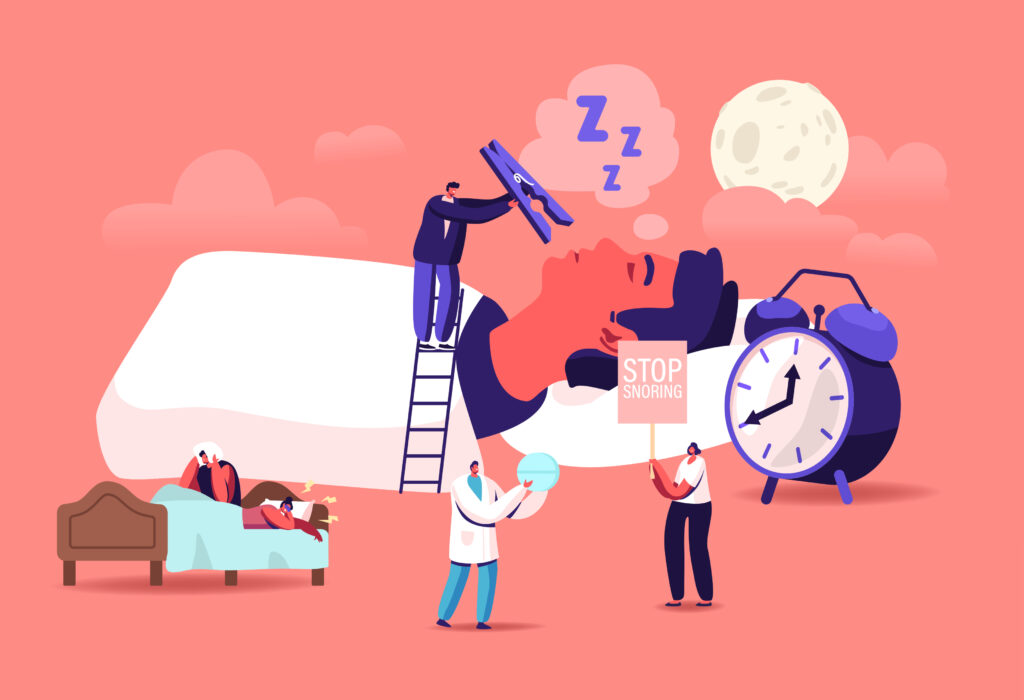
Overview
Sleep apnea/apnoea, or sleep apnea syndrome as the case may be, is a medical condition that defines a sleep disorder characterized by frequent interlude/halt and restart in breathing (inhalation-exhalation) throughout your sleeping time. It may last for seconds, minutes, and even hours. People with this condition often get insufficient oxygen and snore excessively due to breathing challenges. They experience low sleep waves and don’t get enough REM sleep.
Sleep apnea can lead to complications like high blood pressure, diabetes mellitus type II, stroke, respiratory diseases, glaucoma, kidney disease, cardiac(heart) diseases, etc.
The condition is most common in women(20-70 years of age). Based on experience, the most common type of sleep apnea is obstructive sleep apnea(OSA). It can be described as a blockage in the respiratory airway. Upper airway tissues may fall, causing the blockage. Obese individuals may have this challenge.
Given the circumstances, when signs of sleep apnea emerge, it’s expedient to visit a healthcare provider for further diagnosis and possible therapies.
Key Facts
- Sleep apnea or sleep apnea syndrome is experienced when there is a regular stop and restart in breathing.
- Sleep apnea can be classified as obstructive and central sleep apnea.
- The most common type is obstructive sleep apnea.
- It may be caused by habits like smoking and the use of drugs, hereditary diseases, allergies, etc.
- Patients spend less time in REM sleep and frequently wake up during night sleep.
- Effects are daytime fatigue, low alertness, moodiness, loss of focus, etc.
- The use of technologies can treat it by constantly supplying air pressure through the airways during sleep.
- Surgery is possible but needs professional counsel.
Types Of Sleep Apnea Syndrome
- Obstructive Sleep Apnea
This typically occurs due to the collapse of the upper airway tissues or narrowness in the airway hence blocking the airway. Factors responsible for this airway blockage could be hormonal changes, the large size of tonsils, obesity, and others.
- Central Sleep Apnea
This type results from the inability of the brain to transmit signals necessary for muscular activities to commence breathing. Any factor that can affect how the brain functions may be responsible for this disorder. This is when a person loses breathing consciousness or the simultaneous occurrence of the two sleep apneas. When the brain is inadequate in sending signals to the respiratory tract to carry out inhalation, the person will have breathing challenges, and oxygen intake will be limited. Constantly, this may lead to hypoxia(low oxygen intake) and hypercapnia (high carbon (IV) oxide intake). If this event persists, it may lead to complications associated with apnea, such as dementia and lack of concentration.
Symptoms
When an individual develops sleep apnea, they become unaware of it because they are sleeping. Even snoring isn’t promptly detected by the one snoring. Therefore, this condition is often observed by people or relatives around them.
The following are common symptoms of sleep apnea.
- Excess sleeping during the daytime.
- Irritability. General alertness is impaired.
- Problems in carrying out physical activities; may lead to accidents.
- Dry mouth in the morning
- Depression and lack of focus during daytime activities. It’s quite common that people suffering from apnea are more likely to get involved in accidents which include driving.
- Excessive snoring during sleep. Sometimes it may become noisy and a nuisance to others around.
- Morning headaches that may prevail for hours.
- Constant waking at night. These are episodes of restless sleep that deny the person the experience of getting enough REM sleep.
Physiologically, there’s a body mechanism set in place to correct apnea during sleep. When a breathing difficulty occurs (inhalation is delayed), Oxygen intake reduces, and carbon dioxide(CO2) is accumulated.
Receptors will pick up signals of the high level of CO2 in the bloodstream and will send alerts to the brain, which in turn will send signals to the body to awaken the person. Upon awakening, the respiratory airway is cleared, and normal breathing is restored. However, this cycle may continue till daybreak.
Diagnosis
A doctor or sleep specialist should diagnose sleep apnea. They will engage in standard clinical diagnostic procedures thus,
- Physical Examination
The doctor will first review the patient’s medical history and carry out a physical examination. Signs of sleep apnea can be observed, but the doctor needs to verify the type and its possible causes. Subsequently approved test will underpin the diagnosis.
- Blood Test
The blood test is performed to rule out certain diseases which are risk factors for sleep apnea. The blood test is used to survey hormonal levels.
- Sleep Study
The doctor may recommend that the patient pass the night in the lab. By this method, the sleeping pattern can be evaluated. The doctor will study the breathing pattern, oxygen levels, heart rate, etc.
While you sleep, also, the doctor may latch you with equipment, the polysomnography. This device will examine your brain, cardiac and respiratory activities, including body movement and oxygen levels.
Causes
Several factors can give rise to events where the airway is blocked. These could be:
- Genetic factors
- Physical factors like the cold.
- Allergic reactions
- Nervous illnesses
- Cardiac, respiratory, and kidney conditions
- Old age
- Habits like smoking and drug abuse (e.g., opioids)
- Hereditary disorders etc.
Obstructive sleep apnea usually results from the relaxation of the muscle at the back of the throat. This muscle supports the tonsils, uvula, and soft palate. Obesity, breathing difficulty, enlarged tonsils, etc., may be responsible for this.
Central sleep apnea results from the inability of the brain to send signals to the muscles so that the respiratory airway is cleared. Some of the above-listed factors can cause it.
Prevention
There may be no extensive ways of preventing sleep apnea, but lifestyles and healthy habits contribute to alleviating the condition thus:
- Quit smoking, the unprescribed use of sleeping pills, and alcoholism.
- Loss excess weight
- Exercise regularly
- Go for a checkup and possible treatment for any hereditary diseases.
- Practice good sleeping habits.
Typical Treatment
The following treatments may be approved to improve and manage sleep apnea.
- The Use Of Devices
This implies using a device to air pressure delivered through a worn mask. This pressure will perpetually keep the airway cleared for optimal airflow. These types of equipment include:
- CPAP- Continuous positive airway pressure.
- Auto-CPAP.
- BPAP- bilevel positive airway pressure.
- ASV-Adaptive servo-ventilation. This is more recommended than others. It studies your breathing pattern, stores it, and uses it as a standard for correcting changes in your breathing pattern.
- Oxygen Supplement
Administering supplemental oxygen via several devices while sleeping is an excellent option to be considered.
- Surgical Therapy
This is usually thought of as the last option. Mainly employed when other methods fail. For surgery:
- Tissues that block the airway are surgically removed(uvulopalatopharyngoplasty)
- For severe cases, a tube is inserted through the back of the neck via a surgical opening to aid breathing while sleeping (tracheostomy)
- After administering anesthesia, soft rods are implanted into the soft palate.
Conclusion
Sleep apnea may not seem to cause any severe harm at the onset. It becomes terrible when individuals begin to express characteristics like loss of concentration and irritability. These may lead to life-threatening events like an accident.
For students, academic activities may suffer. Same with people in various businesses. However, when symptoms appear, it’s advisable to meet a doctor for a proper treatment and management plan.
MOST COMMON






